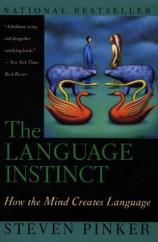Reading Group Guide
Discussion Questions
The Language Instinct

1. All languages are "discrete combinatorial systems," which means they contain rules that combine basic symbols ( as words) into an infinite number of different larger structures (such as sentences). Other such systems are rare, but they do exist. The genetic code of DNA-which serves as the basis for life on earth-is built in a similar way, allowing for the creation of a potential infinity of novel life forms. Some other discrete combinatorial systems that humans possess are involved in aesthetic activities like music and dance. What is the relationship between the language instinct and these other aspects of the human mind? Is it likely that such systems emerged out of language, either through biological evolution or cultural development? Or could they have evolved independently? What sort of evidence would bear on this issue? (Chapters 3, 4, and 11)
2. The structures of speech and sign are constrained by biological mechanisms; they are not cultural innovations. Because of this, the complaint that people nowadays don't use English properly is quite bizarre. It would be like saying that birdsong has been gradually corrupted over the last several hundred years. But writing is a different story. Although it is plainly based on existing languages such as English, it is a cultural invention. Not all societies have it, and children require careful instruction in order to learn it. What is the proper role of "language mavens" in determining rules and standards of writing? How can scientific research on sentence comprehension and composition tell us how to improve the teaching of writing skills? (chapter 7 and 12)
3. We are entranced by the idea of animals learning language, and popular movies and television shows are are populated with singing chimps, talking dolphins, and even the occasional loquacious horse. Pinker argues that from the standpoint of biology, attempting to teach one species the communicative system of another makes little sense. Trying to teach a human baby to sing like a bird or chatter like a monkey isn't likely to succeed, and would not tell us very much if it did. Why are we so fascinated by the idea of talking animals? What is at stake-scientifically or socially-in the debate over the capacities of apes and other animals? How are these attempts to teach human language to non humans different from the study of the communications systems that animals use spontaneously in the wild? (Chapter 10 and 11)
4. Debates over the nature of the human mind have always been intimately related to our political, social, and religious views. Defenders of the claim that the mind is infinitely malleable, free from biological constraints, view this as an optimistic, liberal doctrine, while more biological perspectives-especially those informed by evolutionary theory-are seen by many as tainted by racism and sexism. On the other hand, scholars such as the linguist Noam Chomsky have argued that the moral superiority of the empiricist view of the mind is far from clear. Historically, the notion that humans can be "shaped" in any manner that an authority chooses has been the premise behind many brutal and repressive activities. As Pinker puts it, a blank slate is a dictator's dream. Furthermore, a theory of the mind informed by evolutionary theory is actually inconsistent with the notion that there exist profound cognitive differences between human groups. Should these ethical and political considerations be taken into account as we develop theories of the mind? How have they affected our way of thinking about these issues in the past? In particular, what motivations might have led people to the view that languages are cultural inventions that vary without limit or, alternatively, to believe that language is a species-specific biological instinct? (Chapters 1 and 13)
The Language Instinct
- Publication Date: August 30, 2012
- Paperback: 496 pages
- Publisher: Perennial
- ISBN-10: 0060976519
- ISBN-13: 9780060976514







